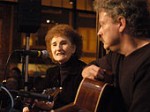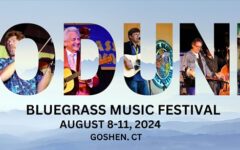Tim Stafford shared these thoughts on the passing of Hazel Dickens.
With the passing of Harley Allen a few weeks ago and now Hazel, I feel like a page is being turned in the history of bluegrass and bluegrass songwriting. Hazel wrote and performed songs at a time when females in bluegrass just didn’t; to say she was a pioneer is powerful understatement.
But she sure didn’t act like one. I think of all the shows I played with her over the years: Sundance Film Festival, Hardly Strictly Bluegrass in San Francisco (the world’s largest bluegrass-related event that truly wouldn’t exist if it weren’t for Hazel Dickens), a rally for the UMWA in Chapel Hill, NC in the late 80s with Billy Bragg, Wintergrass in Tacoma, WA… She was always kind, generous, and went out of her way to rehearse and point things out she liked that you were doing.
Her pitch wasn’t perfect, especially in later years, but there was a power in her singing that connected her directly to people like Aunt Molly Jackson, Florence Reese, and Sarah Ogan Gunning, as well as to her listeners. That haunting, mournful mountain quiver that sends chills up and down my spine.
The connection wasn’t just musical and stylistic–it was cultural, and even political. Hazel grew up poor in a big coal mining family in West Virginia, moved to Baltimore as a young working girl, and saw exploitation and pain among working people up close. It prompted her to write songs that pulled no punches, Hard Hitting Songs for Hard Hit People, as she said in the title of one of her albums.
There was always a crowd of people waiting to see Hazel that absolutely adored her, and lots of them were women. When she would do Working Girl Blues, women would come out of their seats. A victim of domestic abuse, she could be tough in songs like You’ll Get No More of Me or Scraps From Your Table.
I’ll never forget during a concert at Sundance, when scads of Hollywood types were gathered around, she ran out of ideas for songs and I suggested Black Lung, an a cappella number that she wrote after watching two of her brothers die from the disease. She wasn’t sure that crowd would get it, but she nailed it to the wall and the place exploded.
But there was a humanity in Hazel that shown through louder than any of her working paeans, or tender ballads, or mournful working laments. She would be laughing at me right now, saying, “Wow Tim, you really are going to make them think I was a tough old gal!”
And she was. But she was as fine a person as I’ve ever known in my days.








